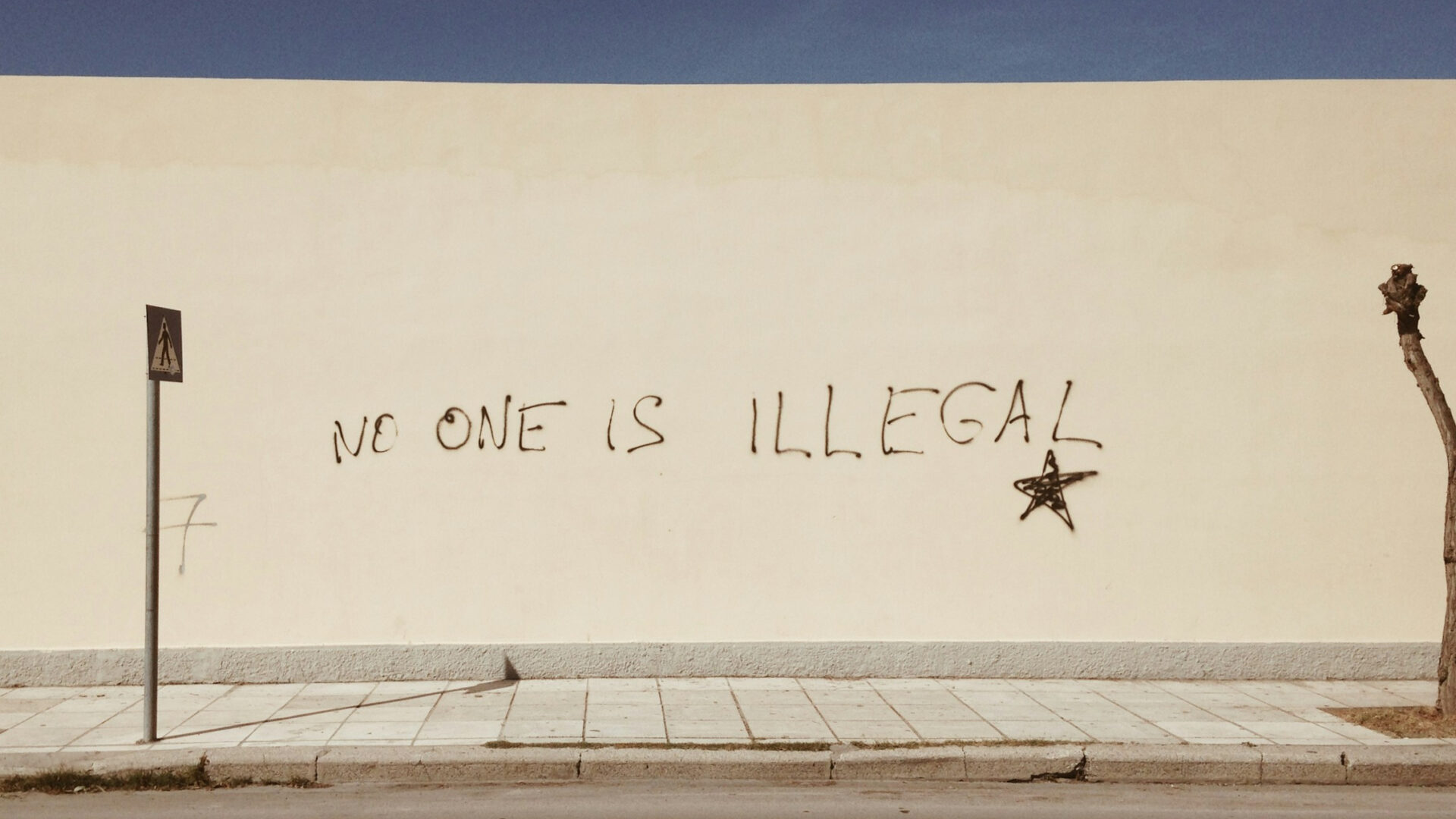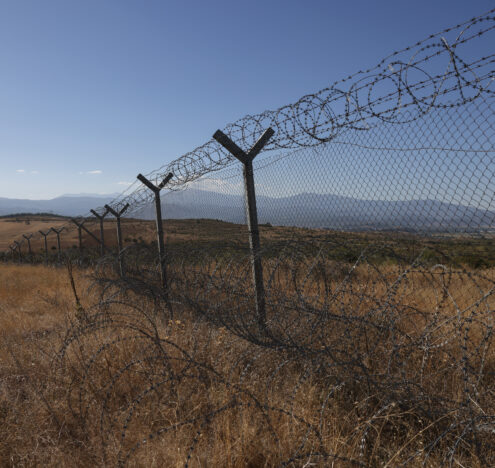The journey from Pakistan was long and difficult. To reach Greece four years ago, Ali* set off on foot across the country’s northeastern land border with Turkey in the Evros region. After passing the highly policed boundary, he said, he walked for 15 days to reach Thessaloniki, the city on the country’s northern coast. For the last three years, he has lived in an agricultural warehouse in Thebes — without legal residency documents, he has few options — and works as a farmhand in onion, wheat, cotton, and potato fields.
Early on, Ali was one of six people living in the warehouse, but four have since departed for Italy. There, it’s easier to obtain legal papers and the wages are better, Ali explained. Although he hopes to bring his family from Pakistan, it is impossible as long as he doesn’t have a residency permit.
“Invisible Workers”
Ali is among the hundreds, if not thousands, of so-called “invisible workers” who receive low wages and have little legal protection against exploitation. Many hope to get legal residency status and improve their living conditions in Greece. But if he cannot get his hands on papers, he said, he will leave.
Home to some 11 million people, Greece has long depended on workers from such countries to fill gaps in the agricultural, domestic labor, and construction industries, among others. In 2021, the Greek government introduced a new measure to speed up deportations. Along with soaring living costs, fresh migration restrictions have made it increasingly difficult for migrant laborers to get by in the country.
Javed Aslam, president of the Pakistani Community in Greece, said that of the migrant workers coming from countries such as Bangladesh, Pakistan, and Sri Lanka, “90% of them live like slaves,” facing the daily risk of detention by authorities and exploitation at the hands of their employers.
Exploitation
Because of its geographic location on the southeastern edge of Europe, Greece has long served as one of the first landing countries for refugees and migrants making the trek to Europe. Since returning to power in July 2019, the ruling New Democracy party has sought to crack down on arrivals by land and sea.
Nonetheless, Greece faces a labor shortage of tens of thousands of workers in sectors that are key to the country’s economy — agriculture, construction, and tourism. To make up for this shortfall, the Greek government passed a new law (5078/2023, Article 193) that allows authorities to grant “residence permits with the right of access to paid employment and to the provision of services or work to third-country nationals” who meet certain criteria.
The Greek government also reached bilateral agreements to replenish the depleted workforce with some 40,000 migrant laborers from six countries: India, the Philippines, Vietnam, Armenia, Georgia, and Moldova.
Yet, the density of these agreements as well as the complexity of the bureaucratic process, could easily stand in the way of their enforcement. In the past, similar agreements have hit roadblocks “due to lengthy … bureaucratic procedures,” Generation 2.0 for Rights, Equality, and Diversity, a nongovernmental advocacy group, said in an email statement.
The group added that the government could fill gaps in the workforce with people who “have already been in the country for years, living invisibly and contributing decisively to the Greek economy” while working without legal papers and enduring “wretched working conditions.”
According to Greece’s initial agreement with India, so-called unskilled workers will be able to stay in the country for five years as long as they make periodic mandatory returns to their home country. Those the Greek government considers “highly skilled workers” can obtain three-year residence permits.
“Deprivation and Violation”
For most seasonal workers, Greece offers poor living and working conditions, a fact that adds to the uncertainty surrounding the country’s migrant labor policies.
Despite past promises, Generation 2.0 explained, “the experience of many seasonal workers already in our country is that of deprivation and violation of their fundamental rights.” The group added that many seasonal workers face “miserable working conditions, poor wages, long working hours, undeclared work, and substandard housing.”
Meanwhile, migrant workers without legal documents have no choice but to work under the table, a reality that the state tacitly tolerates, and receive meager wages compared with their Greek counterparts. Because of their legal status, they also risk partial and late payments from employers who benefit from a lack of clear, written, and official work contracts.
[T]he experience of many seasonal workers already in our country is that of deprivation and violation of their fundamental rights. – Generation 2.0
According to Generation 2.0, such “seasonal workers, both EU and non-EU citizens, migrants, refugees or applicants for international protection should be employed based on the requirements of the applicable agreements on labor and employment under the national and EU law and International Labour Organisation’ s conventions.”
Struggling to obtain legal documents, many migrants and refugees have left for elsewhere in Europe: Italy, Portugal, and the Netherlands, for instance — countries where residency procedures are simpler and wages usually higher.
As Greece looks to implement its new measure to bring foreign workers, Generation 2.0 insists that it offers an opportunity for the government to honor “basic guarantees of equal treatment” for the migrant laborers already in the country, including “protection from deportation [and] rights to work, social security, and social protection.”
But if the government seeks the “opportunistic” chance to bring in new foreign workers “without allowing family reunification or establishing the opportunity [for] long-term residence or Greek citizenship,” the advocacy group argued, the new plan “is not a viable option.”
“Good and Bad”
Meanwhile, a bill passed in December is expected to help an estimated 30,000 undocumented migrants in obtaining a work permit so long as they have lived in the country for three years. Yet, its success will depend on the extent to which the procedures are made simple for these migrant workers. There are already law firms on the internet that undertake such cases.
Speaking of the plan in February, Dimitris Kairidis, Greek Minister for Migration and Asylum, told the Hellenic Parliament that 2024 would be the “year of legal migration” to Greece. “A migrant who has come here legally, who works here legally, who pays taxes and contributions and applies for renewal of their residence permit has been suffering for years,” Kairidis said.
Of course, there are also complaints that employers treat them like slaves.
– Javed Aslam
The new measure, however, is projected to provide a pathway to legalization for only around 10% of the country’s estimated 300,000 undocumented workers.
For his part, Aslam says this bill has led to some positive progress, explaining that many previously undocumented workers have received residence permits and many others have applied to legalize their presence in the country. “As always, there are good and bad,” he added. “The good thing is that in three to five weeks, by getting this certificate, they can work. Of course, there are also complaints that employers treat them like slaves.”
Meanwhile, the precarious conditions surrounding residence permits have left many in a state of limbo. Those in need of residence and work permits “have no rights at work,” he said, while “a Greek or European worker has rights and is treated with respect.”
*Ali spoke with a pseudonym in order to protect his privacy.




















